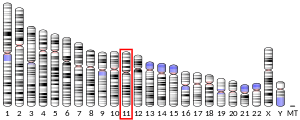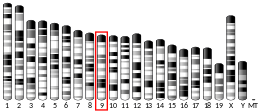BTG4
Protein BTG4 also known as BTG family member 4 is a protein that in humans is encoded by the BTG4 gene (B-cell translocation gene 4).[5][6] BTG4 has anti-proliferative properties and can induce G1 cell cycle arrest.[6]
| BTG4 | |||||||||||||||||||||||||
|---|---|---|---|---|---|---|---|---|---|---|---|---|---|---|---|---|---|---|---|---|---|---|---|---|---|
| Identifiers | |||||||||||||||||||||||||
| Aliases | BTG4, PC3B, BTG family member 4, BTG anti-proliferation factor 4, APRO3 | ||||||||||||||||||||||||
| External IDs | OMIM: 605673 MGI: 1860140 HomoloGene: 9734 GeneCards: BTG4 | ||||||||||||||||||||||||
| |||||||||||||||||||||||||
| |||||||||||||||||||||||||
| Orthologs | |||||||||||||||||||||||||
| Species | Human | Mouse | |||||||||||||||||||||||
| Entrez | |||||||||||||||||||||||||
| Ensembl | |||||||||||||||||||||||||
| UniProt | |||||||||||||||||||||||||
| RefSeq (mRNA) | |||||||||||||||||||||||||
| RefSeq (protein) | |||||||||||||||||||||||||
| Location (UCSC) | Chr 11: 111.47 – 111.51 Mb | Chr 9: 51.06 – 51.12 Mb | |||||||||||||||||||||||
| PubMed search | [3] | [4] | |||||||||||||||||||||||
| Wikidata | |||||||||||||||||||||||||
| |||||||||||||||||||||||||
References
- GRCh38: Ensembl release 89: ENSG00000137707 - Ensembl, May 2017
- GRCm38: Ensembl release 89: ENSMUSG00000032056 - Ensembl, May 2017
- "Human PubMed Reference:". National Center for Biotechnology Information, U.S. National Library of Medicine.
- "Mouse PubMed Reference:". National Center for Biotechnology Information, U.S. National Library of Medicine.
- "Entrez Gene: B-cell translocation gene 4".
- Buanne P, Corrente G, Micheli L, Palena A, Lavia P, Spadafora C, Lakshmana MK, Rinaldi A, Banfi S, Quarto M, Bulfone A, Tirone F (September 2000). "Cloning of PC3B, a novel member of the PC3/BTG/TOB family of growth inhibitory genes, highly expressed in the olfactory epithelium". Genomics. 68 (3): 253–63. doi:10.1006/geno.2000.6288. PMID 10995567.
External links
- Human BTG4 genome location and BTG4 gene details page in the UCSC Genome Browser.
Further reading
- Auer RL, Starczynski J, McElwaine S, et al. (2005). "Identification of a potential role for POU2AF1 and BTG4 in the deletion of 11q23 in chronic lymphocytic leukemia". Genes Chromosomes Cancer. 43 (1): 1–10. doi:10.1002/gcc.20159. PMID 15672409.
- Strausberg RL, Feingold EA, Grouse LH, et al. (2002). "Generation and initial analysis of more than 15,000 full-length human and mouse cDNA sequences". Proc. Natl. Acad. Sci. U.S.A. 99 (26): 16899–903. doi:10.1073/pnas.242603899. PMC 139241. PMID 12477932.
- Dong W, Tu S, Xie J, et al. (2009). "Frequent promoter hypermethylation and transcriptional downregulation of BTG4 gene in gastric cancer". Biochem. Biophys. Res. Commun. 387 (1): 132–8. doi:10.1016/j.bbrc.2009.06.140. PMID 19576178.
- Yoshida Y, Hosoda E, Nakamura T, Yamamoto T (2001). "Association of ANA, a member of the antiproliferative Tob family proteins, with a Caf1 component of the CCR4 transcriptional regulatory complex". Jpn. J. Cancer Res. 92 (6): 592–6. doi:10.1111/j.1349-7006.2001.tb01135.x. PMC 5926753. PMID 11429045.
- Toyota M, Suzuki H, Sasaki Y, et al. (2008). "Epigenetic silencing of microRNA-34b/c and B-cell translocation gene 4 is associated with CpG island methylation in colorectal cancer". Cancer Res. 68 (11): 4123–32. doi:10.1158/0008-5472.CAN-08-0325. PMID 18519671.
- Tirone F (2001). "The gene PC3(TIS21/BTG2), prototype member of the PC3/BTG/TOB family: regulator in control of cell growth, differentiation, and DNA repair?". J. Cell. Physiol. 187 (2): 155–65. doi:10.1002/jcp.1062. PMID 11267995.
This article is issued from Wikipedia. The text is licensed under Creative Commons - Attribution - Sharealike. Additional terms may apply for the media files.



